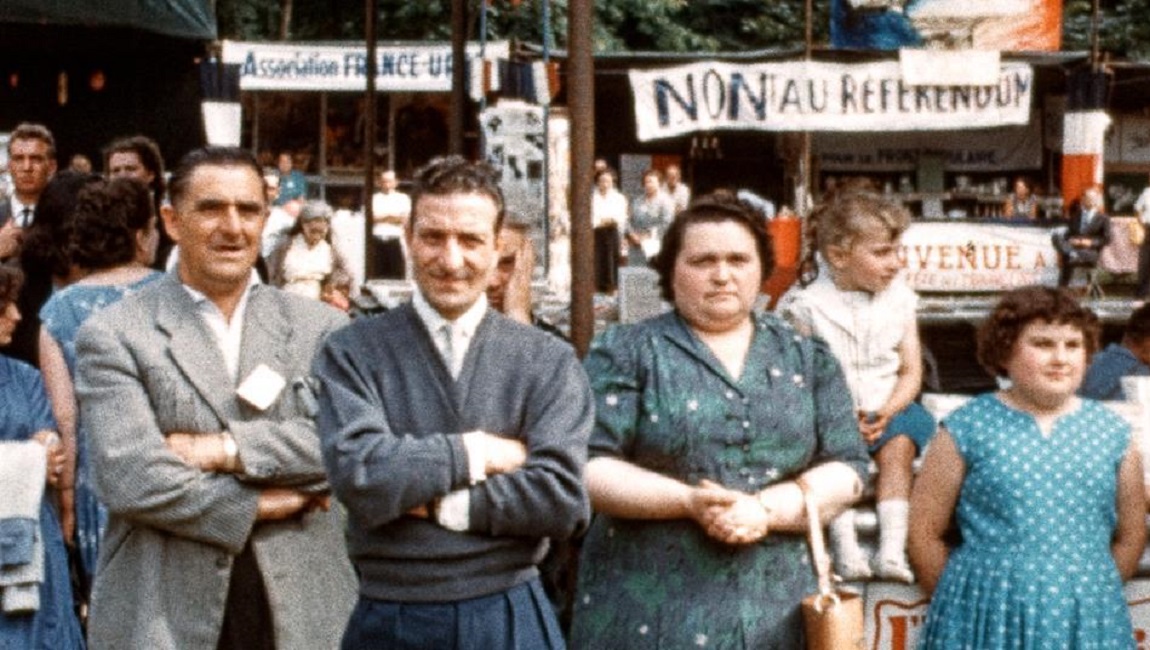Troubled families rarely dissolve overnight. Instead, a slow erosive process corrodes pacts and compromises over weeks, months, and even years. Inevitably, each member becomes trapped in a brutal cycle of indecision, doubt, and mistrust, where love, devotion, and loyalty are hollow signifiers of a personal environment long vacated. Lixin Fan’s sweeping documentary Last Train Home frames this type of unsettling familial upheaval within the epic annual journey of tenement workers from city to countryside during Chinese New Year. After showing this colossal human migration, Fan zeroes in on her subjects, married couple Seqin Chen and Changhua Zhan, who work in a clothing factory 2100 km away. The duo makes the yearly trek home to see their children, 16-year-old Qin and 8-year-old Yang, who live in the country with their grandmother.
Fan immediately begins to distinguish two separate lifestyles with a visual motif: the endless cityscapes shrouded in grey skylines, the cramped interiors, and the walls of bodies contrast with open fields and majestic mountainsides, where the sun shines through the clouds as if to highlight an extreme isolation. But the exponential economic possibility of the one will always overwhelm the simplicity and purity of the other. The textures of this philosophical dichotomy are in the foreground of Fan’s exploration of the modern Chinese economic predicament. Children sleep on metal slabs in factories as they wait for parents to get off work. Cramped train cars plunge through the snowcapped countryside, the windows fogged from the copious amounts of people packed into such a tight space. This attention to detail comes to fruition during one horrifying centerpiece late in the film, as Chen, Zhan, and Qin wait for nearly a week to board their train, which has been delayed because of a terrible snowstorm. Bodies push together, causing waves of movement that sway in random directions and constantly fragment spatial relations. Screams of terror puncture laughter, crying and numbing silence, creating an auditory mosaic. Fan’s scope is so large, in fact, that we nearly lose track of the family immersed in this white whale of travelers.
But the film is more about the constant pressure of the individual to fulfill their responsibilities. Fan details a kind of emotional longing that defines each of the three main characters. Chen and Zhan yearn for their children to grow up and make enough money so they can retire from their grueling work in the factory. Chen even expresses as much on the couple’s first visit home; “My one wish is that you children study hard,” she says, her eyes wet with a mixture of hope and worry. But the children harbor resentment for their absent parents — especially Qin, who rejects their wishes for her to remain in high school, and chooses instead to take a menial job in an urban factory. We watch Qin burn spirit money at her grandfather’s grave and confess dark feelings about her parents, adamant in her belief that all they care about is money. Later, Qin stands alone atop a hill overlooking her country home, immediately before boarding the bus to the city. Her loneliness is striking. Her traditional parents are flummoxed by their child’s perceived selfishness, and this sudden act of defiance creates a series of ripples that will reveal the repressed judgment a child feels for its parent, and vice versa.
Generational dilemmas are the core narrative force in Last Train Home, driving both the physical push of human movement and the invariable emotional warfare silently oozing from every familial encounter. The divide between perception and reality grows as Qin upends her parents’ expectations, sending the entire family into a downward spiral. Both parents begin to doubt their decision to leave home in the first place, and Chen remembers the sacrifice clearly; “I hardened my heart and left with my husband sixteen years ago,” she tells us, before tears stream down her face. But this isn’t regret or even anger. It’s the vigorous disappointment of a life lived and worked, but not fulfilled in the expected sense. In a heartbreaking finale of separation, Last Train Home takes on a poetic and social relevance that ends in one last life-altering decision. For these people, Fan’s concluding fade to black doesn’t mean the end of the film, but just another lengthy waiting period for a family on the edge of permanent disillusion.







